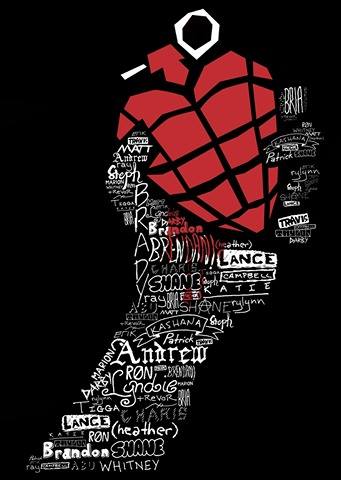Don’t want to be an American Idiot? Then you’re going to have to travel up to Milburn Stone Theatre to see their visceral production of Green Day’s American Idiot. But before you do, we’ll put you in the know and keep you informed by presenting you with a TheatreBloom exclusive interview with the show’s Director Lance Bankerd. Hear what Lance has to say regarding the production and what it means to today’s audiences.
Thank you for sitting with us, Lance, if you could give us a quick official introduction and remind the readers of some of your more recent credits on stage, we’ll get started.
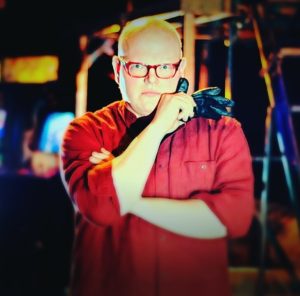
Lance Bankerd: My name is Lance Bankerd and I’m directing American Idiot at Milburn Stone Theatre in Cecil County. I’ve recently returned to Maryland and was just on stage with Third Wall Productions as Bill Sykes in their Oliver! They’re a neat little company, very family oriented. They’re from the ground up, you know? Real nuts and bolts, they’re building all their scenery and props and stuff and they’re in a really great location for that over in Hamilton. It’s great because they’re teaching kids how to do DIY theatre, which in this arts climate is really great. I mean that’s the original way theatre was done, so it’s cool to see the old “lightbulb in a coffee can” again. Before I left, I think the last thing I did was actually here at MST, I was Javert in Les Miserables. And of course since then I’ve been doing Joseph up at Oregon Ridge Dinner Theatre. I also did Thumbelina with Wixie (Wixie Children’s Musical Theatre) up in Hunt Valley. I’m Horace the Handsome Goldfish. Kids love me. I’ve been keeping busy. I’ve been teaching with Spotlighters’ afterschool program. I’m always up to something.
What was the draw to want to take on American Idiot?
Lance: It’s funny, I had actually never heard of it as a musical. I vaguely remember when the album came out back when I was in college. That was what, 2004? So I wasn’t really familiar with it. I was a freshman in college during 9/11. I was in French class when the towers fell, well when the first one got hit. Then I was in my dorm room, and I had the biggest TV on the floor so everyone was in my room. 9/11 was a game changer. I think that’s what is so interesting about the piece. It responds directly to that. The pleasure boat of the 90’s was over. I think that’s hard for the people who weren’t around for the 90’s to really grasp what that means. You know, it was the Clinton years, we were riding high financially, things were relatively peaceful, there was prosperity. And then all of the sudden 2001 hits and bam. Shit. We’re vulnerable. And our government does questionable things.
I didn’t see the tour when it came through, I’m not entirely sure I was aware there was a tour to see. I know that now, obviously, but not when it was happening. I had a buddy who saw it at Berkley Rep, I think. Bambi Johnson (Artistic Director of Milburn Stone Theatre) had actually contacted me to see if I was interested. I said “Absolutely, can I come pick up a script?” I’m not sure she believed that I had no idea what it was all about. I’m fortunate because usually I’m pitching what it is I want to direct, and people often say “yeah, that’s great we’ll do that production.” It was just so neat to get something sight unseen and respond to it accordingly. My reaction was so honest and it had to happen quickly. I already had a cast, I inherited them. I inherited everything, though I did get to redesign the set.
Were you a Green Day fan?
Lance: Not really. I mean I had heard American Idiot, the album. I liked Dookie, their album from the 90’s. But that was more so because it was the cool thing to listen to when you were hanging out with girls, or when you were hanging out at the 7-11 or in my buddy’s car. The guy who had the car could drive, so if he listened to Green Day, we all listened to Green Day. I was never really into the punk scene. I had friends who were, but they were into the “real punk scene.” Green Day is sort of mainstream, really more pop-punk.
Was it a challenge coming into a show that had already been cast and somewhat laid out and having to then take it over as an outside directing force?
Lance: In a way. I thought it was going to be more so than what it was, especially with the cast. I’m persnickety when it comes to casting, so having a cast that was already picked for me was something new. I was concerned about that. Is he going to be what I want? Is he or she going to be able to do this or that? And they all far exceed my expectations. The cast has just been really incredible. They’re a young cast. Brendan Sheehan, who’s playing our Johnny, had actually played the role before somewhere in Delaware. He’s incredible. He came in very strong. Darby (actress Darby Elizabeth McLaughlin) plays Whatshername and she’s awesome. The ensemble is awesome, they’re all awesome. Every single day every single one of them is creating a new moment. They’re a cast where a director can really be proud and amazed and it’s really created a collaborative environment.
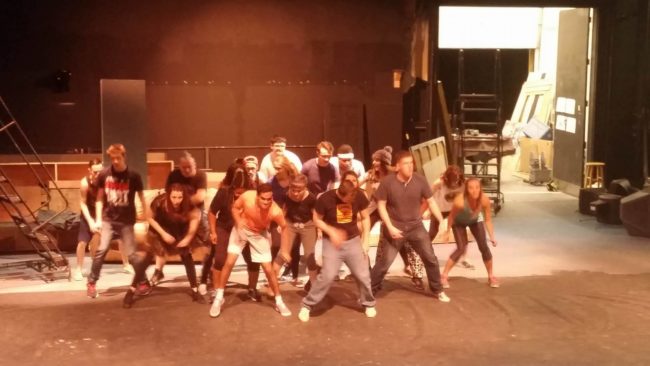
You had mentioned that you’ve got a very young cast, has that been challenging?
Lance: My cast is so young. At the first rehearsal I asked them did any of them remember 9/11 and someone said “I was one.” I groaned. It’s an interesting negotiation trying to get them to understand the period specific things, like the anxieties that the piece deals with in a post-9/11 world: surveillance, unprovoked invasions of other countries, and things like that— these are all things that are second nature to them, they take them for granted. I say “Our government is questionable!” with great vehemence, and they just sort of look at me and say “Yeah?” like it’s no big thing. It’s insanely frustrating because that’s something that my generation had to realize and had a major shock in discovering. I grew up watching G.I. Joe in the 80’s with the red scare. I remember when the wall fell down! I was super politically informed from a very young age, and that’s a blessing and a curse. I’m informed, but I’m also batshit crazy. I’m also opinionated.
But they’re great. They’re all just diving right in. These are young hungry actors who aren’t afraid. They’re asking “Can I do this? Can I do that?” They’re bringing great ideas to the table. They’re creating this incredible scene work that was probably never meant to be in the show. They craft these incredibly beautiful moments like when Heather is reading What to Expect When You’re Expecting while Will is sitting there packing a bong. Or we’re seeing Extraordinary Girl— I mean you want to talk about giving people poo on a platter— the stage directions for that song “Extraordinary Girl” says “…she flies in wearing a Burka and they perform an aerial ballet as Tunny reels high on morphine.” What? You can’t just write down what you did in the Broadway production. That’s not stage directions that’s a play-by-play of what you already did with a limitless budget and big Broadway backers. What in the hell are we supposed to do with that?
Am I to understand there will be no aerial ballet?
Lance: There will be no aerial ballet. They will be soaring on the high of theatre magic alone. But we kind of took that scene as a change to talk about how we view and treat people who are emotionally damaged; we examined PTSD. It’ easier to medicate than it is to address the root of the problem, which is that we probably shouldn’t send people to war. The same thing happens for Will. He’s got this great number, “Give Me Novocain.” And you’re looking at it— really looking at it— Novocain. That’s not even a feeling good or feeling bad drug. That’s a numbing drug. Will just wants to be numb. He doesn’t want to feel it. It’s a Band-Aid, a temporary salve, a “leave me alone for a little bit.”
Band-Aids do not fix bullet holes.
Lance: No, they do not. And that’s actually a lesson that we get to see Tunny, played by Matt Peterson, learn through Extraordinary Girl, played by Lyndie Moe. She’s done an excellent job of taking this strange— I mean the character’s name is Extraordinary Girl, for Christ’s sake, what are you supposed to do with that? But she’s created this compelling caretaker character that really brings Tunny back to life. And the journey takes a year. Or five. It’s the fastest deployment, injury, and recovery I’ve ever seen. Actually— for all of them. Because Johnny becomes heroin addicted and clean and sober with a snap of his fingers. So this is the fastest year ever.
Do you think this show has a high relatability factor for audiences?
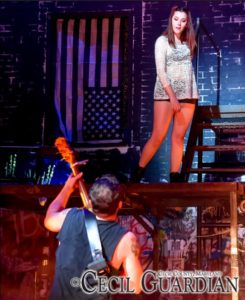
Lance: What’s neat about this show is that it’s sort of an everyman story. It’s an archetype of characters instead of isolated individuals. Johnny is a struggling musician; he gets involved with drug addiction. This happens with a lot of artists. And since then we as a society has come to realize that prescription drug abuse leads to heroin addiction and we’re breaking apart the stigma of it. Seeing these archetypal characters and telling their stories and getting a chance to add to it? That’s pretty amazing. I mean the show itself is pretty short, it’s only 90 minutes and there isn’t an intermission. It’s hard to teach this generation to be punk. It’s not that they’re not resistant. They don’t have that upstart spark of “We’ve been betrayed!” They’re more wry, you know? They’re more cynical.
What would you say has been some of the other challenges you’ve faced tackling this show?
Lance: The script itself. Oh my God, I feel like I need to show you these pages. Some of the stuff that’s written in the stage directions? It’s just— I can’t even describe it. It says things like “Johnny challenges his friends to care.” Or “Johnny goes out to the street to claim his connection with the city.” Nonsense! It’s total nonsense. And that just leaves chunks missing, so that’s where I fill in stuff. Like we see Will (Abu Akki) and Heather (Charis Latshaw)— now Abu played Marius and Charis played Eponine in MST’s Les Mis— and we riff off that relationship a little bit, they finally get together! And it works out about as you’d expect. We get to see a lot of cool relationship dynamics and character experiences in this show, no thanks to the stage directions. There are so many things that this show can really explore that we can take the opportunity to examine and flesh out visually.
How are you going about conceptualizing this show?
Lance: I’ll tell you what’s really informing our aesthetic is the less non-mainstream punk scene. We’re making it more “punk rock the ride” and less what these people in 2001 would have actually been like. It’s a little bit grittier than it probably should be, but it’s important when you say “we’re doing a punk musical” that you really show that dirty, gritty, street side of things.
But getting back to those things I was mentioning in regards to fleshing things out— we get to see the experience of war first hand through Tunny’s experience. We get to see a person who signs up to be deployed in a post-9/11 patriotic, jingoistic fervor. And then he gets injured and comes back damaged. I really kind of embellish that but I don’t want to give away the visuals, you’ll have to come and see it.
Heather and Will, their whole story is that they’re friends with benefits and she gets pregnant. He’s getting ready to move to the big city with his two buddies and then he makes the difficult decision to stay. But what are the challenges of becoming a father when you’re so young, trying to maintain your social life, being alone and knowing there are people out there having fun while you’re isolated. There’s no Facebook in the time of this show, but they manage to capture that social media problem before social media exists. When you look at Facebook everybody looks so happy, what about me? But you have to remember you’re only seeing the best things. Will’s only getting the postcards from the city saying how great everything is. He doesn’t see all the shit that’s going on. So he’s isolate at home, feeling stuck, feeling trapped, not knowing what the right thing to do is.
Did you want to flesh out a bit more of what you’re doing with the aesthetic?
Lance: Oh yeah! So I’ve had the cast tag the back wall with graffiti art. That was an experience. There was the lesson that there were no hashtags in 2001. Back then they were called pound signs, they play takes place before the advent of Twitter. So we had to go back and take all the hashtags off the wall. Had to go back and have them take all the Bernie Sanders references off the wall too. After those lessons, they’ve taken total ownership over tagging this wall.
How’s the choreography working out for you in this show?
Lance: Oh my choreographer (Ron Jones) is just amazing. He’s playing Favorite Son too, the soldier that entices Tunny to enlist. He’s just incredible. He embraces the madness. He’s truly incredible. When I say I want a real USO feel to that number “Favorite Son” but I want it to be sexy, he just takes it and runs with it and beep-boop-beep-bam there it is and oh my God it’s perfectly in line with what I was looking for. Or I’ll say something needs a little fix but I don’t know what? And he just zips in and knows exactly what it needs and bam there it is. He’s just beautiful to work off of.
Are you using a live pit for this performance?
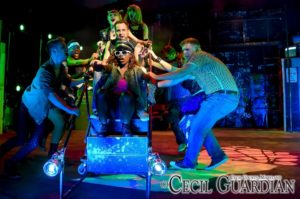
Lance: Oh yeah. Live band. On. Stage. ON STAGE! I wanted everything to bare and for everyone to be able to see it. I wanted it to feel like a real rock and roll show. Nobody is ever leaving the stage. Everyone is on deck the whole time, even when they’re not involved, they’re sitting somewhere on stage. I know that’s not how it’s been done but I’m happy that that’s not how it’s been done. Usually I’ve seen everything so I know what’s been done with a production before, but with this one I didn’t have that. Now I’ve had moments where I thought I was being brilliant, like when I decided we were going to turn the staircase into a bus— by the way we turn a staircase into a bus— and someone in the cast would say “Oh, like they did on Broadway with the scaffolding,” and I’d grumble and shout “Don’t tell me that!” And I’m sure everyone will just say it’s my scaffolding, but no! I thought of it independently. But c’est la vie. That’s how it goes.
What would you say you’re learning from this experience?
Lance: It’s given me a chance to really push what I can do with a show. It gave me a chance to get rid of all the soft goods. It let me see everything bare and naked, and get down to the raw emotions of people. It gave me and the cast a lot of great opportunities to flesh out things and create things, within what we were given in the script of course, but more so than you do with most shows. Perfect example is what Matt Peterson is bringing to Tunny. Tunny is a really weird character. But Matt has turned him into that guy who we all hung out with. You know, the guy who had the car or the guy who had the weed, or occasionally the guy who had the car and the weed. So he was the cool guy you hung out with because he had the car or the weed or the car and the weed. Matt is playing him as that goof. He’s got Tunny growing up in the period I grew up in, which was “we love America’ so when the call to action comes, you go. And he really helps us see how Tunny deals with the disillusion of that. Also, being a big strong guy who—
Spoilers, Lance.
Lance: Yeah, yeah. Okay. Tunny has to deal with his injury after war and as a big strong guy who suddenly can’t— fuck it, I’m just saying it, they’ll see it anyway. He doesn’t have a leg anymore. That’s a huge thing for that character as this big, strong man, and suddenly he can’t walk anymore. So he’s got this beautiful, compelling journey, and Matt just owns it. And then there’s Will’s story. Abu, for a young guy, he’s 19, he just gets it. He’s there in this beautiful, beautiful headspace. They’re all so awesome.
It has also helped free me from what was a more rigid approach to directing a show. Normally I would only work very specifically with things I wanted to on my terms. Because it’s such a young cast they’re so wild and rambunctious. Rehearsals were very loud. I think normally I’d be a lot more pretentious and be yelling about the need for quiet, but instead at the first rehearsal when it started happening and I was getting really frustrated I just made that call to let it go. And it’s actually fed the energy of the show. Now this is not for every show, but for this show, the more casual loosey-goosey nature has helped to cultivate a machine that has us beautifully buzzing along.
Do you think “American Idiot” is the definitive number of the show?
Lance: It’s interesting that they open with “American Idiot.” But I’m pretty sure that isn’t the number that defines the show despite being the title. It more sets up our placement, like where we are— it sets the tone for the show. Even in the print advertising they refer to the cast as idiots. It’s a little lazy but obvious and cute. I took great offense to it, well not great, but some. I’m an idiot, they’re not idiots, they’re fucking awesome. Of course, all artists are idiots, but anyway, how it really is…the people performing the show are not the American idiots, the people in the audience are. Listen to what they’re saying. They’re saying they don’t want to be the American Idiots. They don’t want to be the people who do what they’re told, who are force-fed by the media.
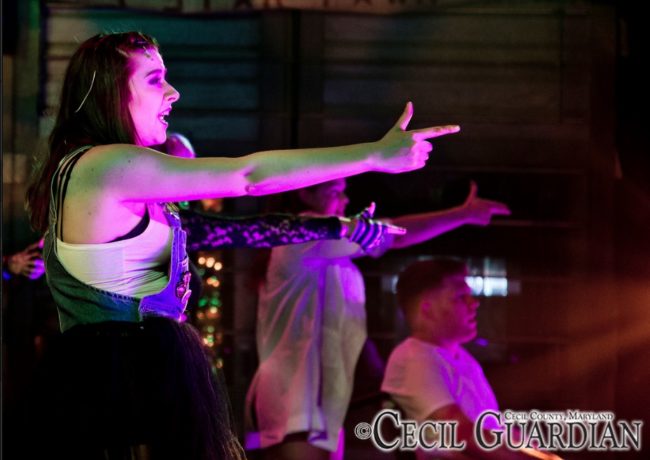
I would say where the show shifts for me is “21 Guns.” That number has become for us such an important moment. Whatshername is trying to level with Johnny while he’s in the throes of his addiction at the bottom of the barrel. It’s his last opportunity to get back up, the dark night of the soul. Tunny is struggling with PTSD, the depression of post-deployment, the depression of post-amputation. And his Extraordinary Girl has to bring him out of that. Will ends up alone there, still stuck out in suburbia, but now he’s all alone with nobody around him, he doesn’t have his girl anymore and he doesn’t have his kid. Here we see the band— these three guys who were going to the big city to pursue their dreams— broken apart in three separate places all alone. I think that’s the moment where we’re able to really move forward, grow-up, and move past for those characters, once they’ve all hit the bottom and are alone.
What’s the personal tie-in for you with this show?
Lance: I get to load my personal baggage into it and exercise it out. It’s very therapeutic for me and it informs the show. Now, it’s not masturbatory, because nobody knows— well my cast knows, but as far as that reading to the audience it’s not like you’re getting a shrink session with me personally. But take Abu, for example, who plays Will. His character is dealing with having a new child and those circumstances. Now what happened between Will and Heather isn’t what happened to me and my wife. But the feeling of being separated from your child, the feeling of struggling to still be you but also having to align you as a person who is now responsible for another human life, and the negotiating of parenting with a person you’re no longer together with, that’s really a cathartic thing for me.
My uncle was in the Marine Corps in the Vietnam era. So the whole Tunny storyline really speaks to me. I can remember distinctly in Rehoboth Beach, Delaware, sitting on the couch with my uncle and saying, “I want to be in the Marine Corps too.” And he sat me down, weeping tears from his eyes, and he made me promise that I would never join up. So having that here is another personal tie-in. And then my oldest brother struggled with drug addiction. The people in the cast think I’m nuts because I’ve got a story that goes with everything in this show. You know, Ol’ Wild Oats Bankerd. But we think these things are so far removed from us, but we’ve all got something, we’ve all got some story. I had a friend in college who’s dad would have to lock himself in the basement on 4th of July because he couldn’t look at the flags or the parade and he couldn’t handle hearing the fireworks. And here we are “let’s celebrate America and have pride” and there he is, an actual American hero, locked in the basement because of PTSD. It’s rewarding to explore these things in a group setting. It’s therapeutic but it also raises a lot of questions.
You feel like you have to speak intellectually about our responsibility as artists to communicate to the world. But these guys just get the feeling of it. They know straight away what will be effective for the audience without all the intellectual pretense and bullshit. And it’s astonishing because they’re so young. They’re all very much in love with the piece and I love that.
What is it that you’re hoping people will take away from seeing American Idiot?
Lance: Other than everything I’ve just said? Obviously, I want them to have a good time. It’s neat that the piece ends with “Good Riddance” and that’s not actually from the album, that’s an old school Green Day song that they added in as an encore. But I think it works because it kind of transitions you back into the real world. It’s super bubble-gum, but it’s nice. It touches that nostalgic feeling inside of us. It takes me back to the time of making out in cars. It helps everyone have a pressure-release to get back into our real world so that they can realize they were there being entertained. I hope people get the passion out of it and the fact that the cast is absolutely killing it out there and putting their whole hearts out there for everyone to see.
The messages of the show are things that are in the cultural consciousness. Why do we send people to war? What is the gain? Is it for freedom? Is it for democracy? Is it for profit? How do we deal with drug addiction? How do we deal with those that have recovered from drug addiction? How do we deal with young parenthood? How do we help young people who are parents become better parents instead of letting these situations deteriorate? It’s also interesting because the show is sort of a comment on how we revolt or react to dominant things that we don’t like, whether it realizes it or intends to be or not. We may not think of Green Day in that way, but they brought American Idiot to the musical theatre crowd and that’s ballsy. It’s pretty punk.
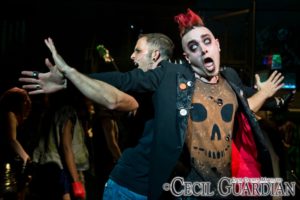
I hope people look back at their own ‘punk’ history, with the anti-establishment views that they had and the iconoclast dogma that they thrived on. We’ll have people just sitting in on rehearsal and they think we’re crazy. Because it’s just so wild. The true story message behind the show? Johnny, the angsty punk, has to realize that part of why his life got fucked up was because of him that he can’t just blame everything on “the band” so that he can move word and become a responsible activist or anarchist.
Why do you want people to come see American Idiot?
Lance: They should come support the Milburn Stone Theatre, a Cecil County cultural icon. They should come to support an arts institution, but also to have a damn good time. You can’t leave this show without rocking and rolling. You’re going to dancing in your seat and laughing your ass off but you’re also going to be touched. It really is poignant. It’s really beautiful. Universally, it will speak to you— man or woman, young or old, any generation, there is something for you. It’s an important show. This is a new kind of musical. People should come see what the state of the arts are. Aside from that? It’s just a damn good time.
American Idiot plays through June 19, 2016 at The Milburn Stone Theatre— 1 Seahawk Drive in North East, MD. For tickets call the box office at 410-287-1037 or purchase them online.
To read the review of American Idiot, click here.

